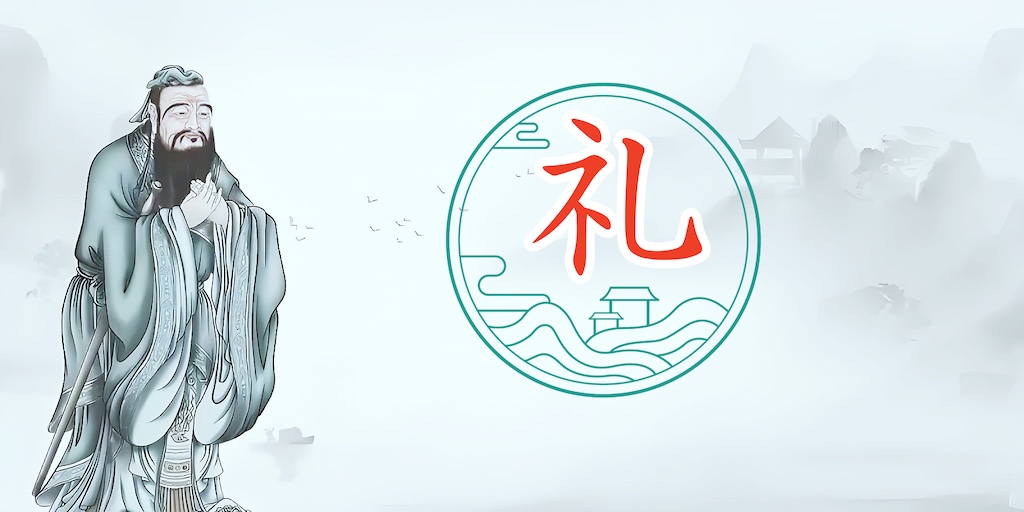In Confucianism, li refers to formal rituals, ceremonies, behavioral norms, social order, and moral standards. For Confucius, li is essential for maintaining social harmony and fostering personal moral cultivation. More than an external framework, li embodies inner moral sentiment and serves as a vital pathway to achieve ren (benevolence) and advance ethical refinement.
Definitions of li from Three Levels
In the late Spring and Autumn period, as changes occurred in the social and political structure, the ideological trend of rule by ritual emerged in the intellectual sphere. The concept of li, less prominent during the Western Zhou period, gradually became widely recognized. Confucian ritual studies were developed by summarizing and building upon the intellectual achievements of this ritual-oriented ideology.
In Confucianism, li are one of its core categories, alongside Ren, forming the two cornerstones of Confucian thought. Through summarizing, refining, and reflecting on the cultural heritage of the Xia, Shang, and Zhou dynasties, Confucius inherited and developed the ancient concept of li, endowing it with new ideological connotations and creatively establishing a Confucian system of thought with li as core.
#1 The Superficial Definition of Li
At the superficial level, li refers to various formalized ceremonies, rites, rituals, and related factors. It is more about liyi (礼仪; ceremonial procedures), liyue (礼乐; the integration of artistic forms such as music and dance into rituals), and liqi (礼器; the instruments and objects used in ceremonial activities).
These are the expressions of li in daily life and social interactions. Conducted according to specific procedures and rules, they aim to regulate behavior, social order, and interpersonal relationships.
#2 Li‘s Definition in Ethical and Moral System
Li refers to an ethical and moral system encompassing virtues such as benevolence, filial piety, loyalty, and trust. These principles are regarded as the highest standards of morality that govern behaviors in all aspects of life. At this level, li is not merely an external standard of conduct but also an internal moral aspiration. Individuals must align their thoughts and actions with these ethical principles to cultivate a harmonious and orderly society.
#3 The Li in Political Hierarchy and State Order
At its deepest level, li represents political hierarchy, the order of the state, and the set of laws and regulations. At this level, li presents the social structure and political system, determining the status, rights, and duties of different social classes, thereby ensuring the stability and orderly functioning of the state. Through the formulation and implementation of Li, different social groups can clearly understand their roles within the socio-political system and adhere to the relevant rules and norms.
The Confucian concept of li reflects hierarchical orders, but this hierarchy is not rigid or absolute but balanced with the spirit of harmonious coexistence. Confucius and his disciples summarized the essence of li with the principle of “harmony is precious,” advocating the harmony among people, society, and nature.
After the Spring and Autumn period, the basic content and scope of li became stable, and the discussions of Li in historical documents, especially in Confucian texts, can generally be categorized into three primary meanings. The three most critical li texts in ancient China,The Rites of Zhou (Zhou Li), The Book of Etiquette and Ceremonial (Yi Li), and The Book of Rites (Li Ji), collectively known as the ‘Three Li (三礼)’, correspond roughly to the three layers of meaning of li. The Book of Etiquette and Ceremonial primarily records ceremonial rituals—an entire system of actions with performative elements in specific contexts. The Book of Rites broadly discusses ethical and moral ideas, explaining the moral significance of various rituals. The Rites of Zhou mainly designs political systems.
Connotations of Li
Li has always played a central role in China’s long history, with its rich and meaningful connotations.
Personal Dimension:
In Confucianism, li guide individuals to cultivate themselves and conduct themselves in life, reflecting their moral character. Through rites, individuals can develop characters like benevolence, respect, and humility, enriching their spiritual and personal worlds.
Confucius regarded li as the foundation of human life, asserting that without understanding and learning “rites,” people cannot establish themselves in the world. At the same time, li reflect emotional concerns and interpersonal communication, as exemplified by the principle of “reciprocity in rituals,” which emphasizes mutual respect and interactions among individuals.
Social Dimension:
Li embody the spirit of social harmony. Confucianism holds that by establishing ritual systems and norms, people can understand and observe proper conducts, thus regulating relationships among various social classes. It can also foster a harmonious, orderly, and prosperous society, supporting social stability and economic growth.
National Dimension:
In Confucianism, li are a crucial component of the national political system. It advocates governing the state through li and integrating ritual systems with legal frameworks to achieve long-term stability and sustainable development. In ancient China, li were central to all state activities to regulate political, social, and educational practices.
Cultural Dimension:
Li are a cornerstone of Chinese culture with its enriched with deep historical and cultural significance. The culture of li championed by Confucianism has played a vital role in shaping the spirit and identity of the Chinese nation. Learning and passing on this culture enables people to understand the essence of Chinese traditions better while enhancing cultural confidence and national pride.
Educational Dimension:
Confucianism deems li as an integral part of education. Teaching people to understand, observe, and practice rites helps cultivate their moral character and social responsibility. Confucian classics such as The Analects of Confucius and The Book of Rites profoundly discussed li, offering invaluable intellectual resources for education across generations.
The Origin and Evolution of Li
The Origin of Li
The origin of li is deeply rooted in the sacrificial activities of primitive societies. According to ancient records, the history of li can be traced back to the time of Emperor Suiren, while the term of li began with the Yellow Emperor. Initially, li was primarily referred to religious ceremonies where people offered sacrifices to the gods and prayed for blessings with specific rituals and rites. As time goes on, li gradually transcended its religious context and became an essential system for regulating social behaviors and maintaining social order.
Institutionalization in the Western Zhou
During the Western Zhou period, rituals was systematized and standardized. The Duke of Zhou, an outstanding statesman and thinker, strengthened the governance of the state by formulating detailed ritual systems. These systems covered all aspects, such as court appointments, marriage, and burial and extended into political, social, and family life. Documents such as The Book of Rites, which followed the Duke of Zhou’s formulation of the rites, expand on role of rites in politics, society, and the family, thus explaining how li has established social norms.
The Restoration of Li in Confucius Time
At the end of the Spring and Autumn Period, Confucius lived in an era where the rites and music were in tatters. Faced with social upheaval and moral decay, Confucius proposed restoring the rites.
He believed that only through the restoration and maintenance of traditional rites could people develop benevolence, personal moral cultivation, and social harmony and stability.
Confucius emphasized that rites are not only external standards of behavior but also an expression of one’s inner moral cultivation.
He advocated for self-restraint and returning to propriety, meaning that one could achieve benevolence by controlling desires and actions to conform to etiquette requirements.
The Evolution of Li after Confucius
After Confucius, rites have been adapted and developed, demonstrating their adaptability and enduring vitality.
Different states developed various rituals and customs from the Warring States period to the Qin and Han dynasties to meet their political and cultural needs. After the unification of the Qin and Han dynasties, the ritual system became a key tool for centralized power and was standardized and widely applied with the establishment of Confucianism as the orthodox ideology.
During the Wei, Jin, and Northern and Southern Dynasties, the ritual system was disrupted by warfare. Still, following the unification of the Sui and Tang dynasties, rites were restored under the influence of foreign cultures, forming a unique system, such as the “Great Tang Kaiyuan Rites” of the Tang Dynasty.
In the Song, Yuan, Ming, and Qing dynasties, the rise of Neo-Confucianism deepened the moral connotation of rites, emphasizing the cultivation of the heart and mind. Socio-economic changes also promoted the diversification of the ritual system; Zhu Xi’s principle of “preserving the principles of heaven and extinguishing the desires of man” enriched the content of rites. Meanwhile, the imperial court regulated people’s behaviors through ritual codes to maintain social order.
In modern times, traditional rites have gradually declined under the influence of Western culture. However, as an essential part of traditional Chinese culture, rites continue to play a role in maintaining ethics and expressing emotions in social life, with people’s daily rituals and customs carrying a deep respect for traditional culture and a yearning for a better life.
The Embodiment of Li in Confucian Classics
In Confucian classics, li (ritual or propriety) is imbued with profound meaning. It serves as a vital expression of social ethics and behavioral norms and a core element of spiritual aspiration. From The Analects of Confucius to The Rites of Zhou, the discussions and interpretations of li outline its deep ideological essence and practical significance.
Li in The Analects of Confucius
Confucius regarded li as the fundamental means to maintain social order and practice ren (benevolence). He stated, “To subdue oneself and return to propriety is benevolence” (克己复礼为仁), highlighting self-restraint and adherence to rituals as the path to achieving ren. His precept, “Do not look at what is contrary to propriety; do not listen to what is contrary to propriety; do not speak what is contrary to propriety; do not act contrary to propriety,” exemplifies the internalization of li as a moral standard, integrating external behaviors with inner cultivation.
Li in The Book of Rites
The Book of Rites systematically organizes and summarizes pre-Qin rituals, offering a comprehensive accounts of their functions, contents, and forms. It categorizes li into five types—wuli (five rites)—to suit various social occasions, reflecting the strong applicability of li to daily life. At its core, li emphasizes respect (jing), that is, advocating reverence for others, nature, and society. This reflects Confucian humanism and a deep sense of social responsibility.
Li in The Mencius
Mencius closely linked li with ren and yi (righteousness), asserting that li is the concrete path to realize these virtues. He championed “li as the foundation,” viewing it as the cornerstone of governance. Mencius’s viewpoints enriched the moral connotations of li, emphasizing its pivotal role in personal cultivation and statecraft.
Li in The Rites of Zhou
The Rites of Zhou describes the ceremonial systems of the Western Zhou dynasty, demonstrating the role of li in governance. It emphasizes using ritual and music to educate the populace to foster voluntary adherence to order. This approach of “governing through li is positioned as superior to “governing through law,” reflecting Confucian thought on social harmony and governance.
The Role of Li in Other Confuciaism Classics
Li is frequently referenced in works such as The Book of Documents (Shangshu) and The Book of Songs (Shijing). As a social norm, it regulates behavior; as a moral expression, it conveys Confucian values and humanistic concerns. Li permeates rituals, familial relationships, and social interactions, bridging the heavens and humanity and solidifying social bonds.
In conclusion, the concept of li in Confucian classics not only reflects the pursuit of social order and moral norms but also embodies a profound humanistic spirit and values. It calls for individuals to consciously observe the norms of the rites in daily life and achieve the state of ren through both internal cultivation and external practices. Furthermore, rites serve as a cornerstone of national governance and social order, showcasing Confucianism’s profound insights into social harmony and stability.

